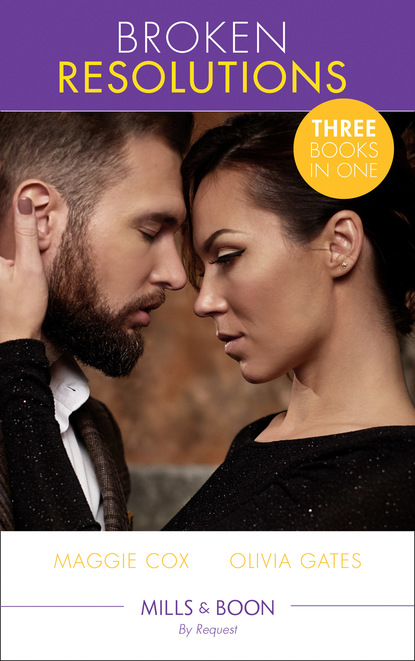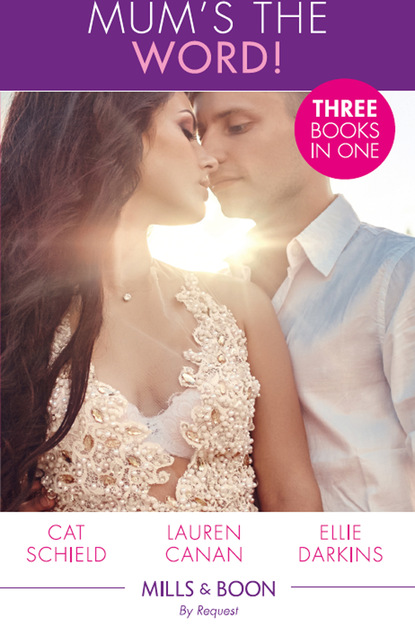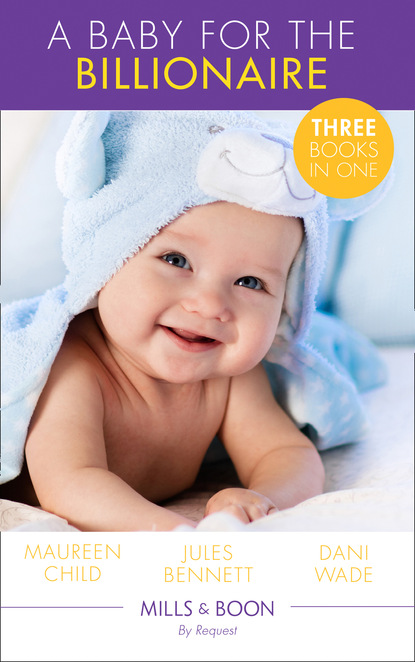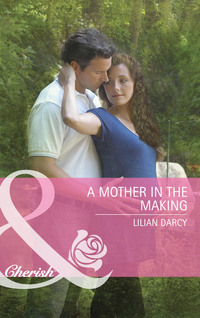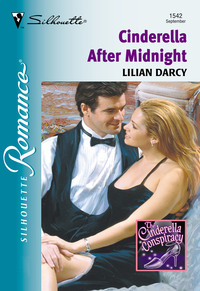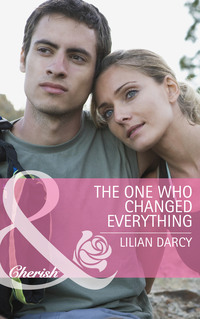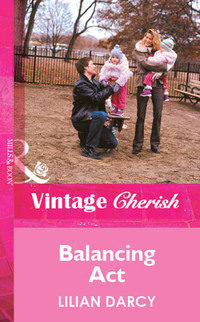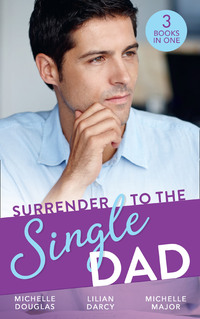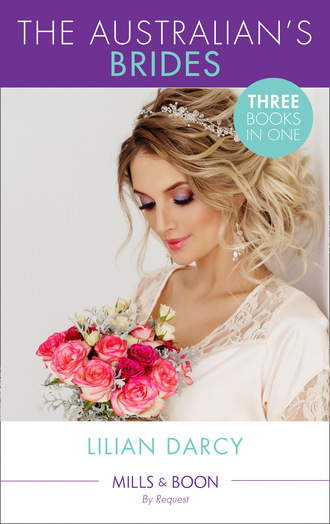
Полная версия
The Australians' Brides
But she’d vowed earlier in the week to jump at any chance to help around here. Searching a creek bed with a flashlight in the dark was definitely something she could do.
“So Gran will put me to bed?” Carly wanted to know.
“That’s right, ducks,” Kerry said cheerfully.
“Yes,” Jac agreed, wondering how many new nicknames her daughter would have at the end of four weeks. She already answered quite happily to Carlz and ducks. “And I’ll creep in and kiss you as soon as I get back, beautiful.”
“Kiss me now, too.”
“Of course.”
A few minutes later, Jac had a not-very-suitable pink angora sweater over her T-shirt, and two flashlights in her lap, and she was seated next to Callan in the four-wheel-drive, ready to leave.
He hadn’t exaggerated about the rough ride. “Problem is,” he half yelled above the engine noise, as they bounced and lurched along, “there’s a track, but you tend to lose it in the dark.”
“Because it’s not much of a track, if it’s what we rode along today.”
“You have a point.”
“Ow! And I’m going to have some bruises!” Her shoulder bumped the door.
“Sorry, I should have insisted that this would be way too much fun for you in one day.”
“After the fun of the bunyip jumping?”
“But you did like the horse riding and the barbecue, right?”
“I liked the bunyip jumping, too, Callan.”
Instinctively, they turned to look at each other at the same moment. His face was shadowed and indistinct in the darkness, but she could see that grin. And she could feel the awareness, the way she’d been feeling it at certain moments for the past four days.
They were both so cautious about it, so full of doubt. It was still only a hint in the air, like the smell of approaching rain or the sound of a church bell across city rooftops. Distant. You had to strain to catch it. The rain might pass over different terrain and never fall. The wind might carry the sound of the bells away.
And they might very easily never act on this … this little zing, this recognition. They might let it go. Smile and move on. It might fade as they got to know each other better, if what they saw on the surface wasn’t reflected deeper within.
Or they might get too scared, because things like this rarely stayed simple for long.
For now, it made Jacinda’s heart beat faster sometimes, it made her stomach go wobbly, and she watched these things happening in her body and didn’t know what to think.
The vehicle lurched again, throwing her in his direction, this time. They jarred against each other, one solid, the other soft. He reached and clamped an arm around her shoulder, working the wheel with one hand. “Going to stop under that tree, and we’ll walk the rest.”
The awareness hit again, stronger in her because she’d felt his body against hers, harder to resist. It made her breathing go shallow. It started her wondering.
The tree he’d mentioned loomed in the headlights, its trunk the same grayish white as the horse Jac had ridden today. After a couple more lurches and the screech of protesting suspension, Callan braked beneath it, switched off the engine and jumped out.
Jacinda followed him, handing him a flashlight.
“See that moon?” he said. “We hardly need these.” He tossed it up in his hand and caught it. “We can leave them switched off until we’re searching the rocks.” Lockie’s description of the Game Boy’s location had been vague.
They tramped along in the dark, surrounded by the same magical blue and silver shadows and shapes that Jacinda had noticed the other night. They didn’t talk. Callan had said as they drove that there might still be wildlife at the water hole at this hour. They always came down at dawn and dusk to drink. “And if we’re quiet, we can take a look.”
It was good not to talk. Good just to walk along, listening to the sound of their feet on rock and sand, listening to the way Callan’s boots creaked, aware of the way he moved with such sure-footed balance and such economy.
In Los Angeles, everyone seemed to talk all the time. They were chained to their cell phones, locked in meetings, constantly updating arrangements, passing messages through secretaries. There was a whole, ever-shifting hierarchy regarding who Kurt would speak to directly, who he’d call back right away, who he’d fob off on an assistant and who he wouldn’t call back at all.
There was a standard repertoire of lies and evasions. I love the script. This is so fresh. We ’re in contract negotiations right now. Our marriage is rock solid. Jacinda had believed way too many of those statements for way too long—believed them when she’d heard them from Kurt, from his staff, from his so-called friends.
She’d had a solitary childhood. Too much silence. First, her parents’ quiet, immaculate home, and then her own protective silences, withdrawing to the inner kingdom of her imagination, as she sat squashed into the corner seat in the back of the car while Aunt Peggy drove her cousins around.
When Kurt had brought her into his world, fresh from taking her college degree in English and creative writing, she’d loved the opening of new horizons; she’d loved all the talk, meeting other writers, traveling to Europe, adventures on yachts and ski slopes and horseback. She’d wanted to talk and hadn’t needed silence, at first.
But then she’d hit overload, and had discovered that her distant, reluctant parents had given her a positive legacy, after all. Silence could be good sometimes. It could be necessary. It didn’t mean that communication disappeared. Sometimes you could understand more about a person when you left some space between all the words.
“We should start looking for the wretched thing,” Callan finally said. His voice sounded a little rusty, as if he hadn’t wanted to break into the rhythm of their walking. “Here’s the water hole just ahead.”
“Can we check for kangaroos first?” she asked him on a whisper.
“They’re much less scary than bunyips, I promise.”
“No, I want to see them drinking. You said we might.”
He looked at her, gave a quick nod, grabbed her hand and they crept toward the water hole. It looked still and beautiful, but they crouched behind a rock, waiting and watching for several minutes, and there were no animals there.
Only the two of them.
Jac didn’t feel quite human tonight, alone with Callan in the desert. Watching the water hole for signs of movement, she heard his breathing, felt his body like a flannel-and-denim-covered magnet just inches away. A man like this gave masculinity a whole new meaning, reminded a woman that human beings were animals, too.
“We were a bit late for them, I guess,” he said, as they walked back toward the ring of barbecue stones in the creek bed. “It’s better when there’s still some daylight. We’ll make a special trip one day. You can bring your camera.”
She’d forgotten it on their picnic, today. “That would be great. Could we get up extra early and come at dawn? I just love the light and the air then.”
“We can climb Mount Hindley, watch the sunrise, make breakfast over the fire in the creek. Would that be good?”
“Oh, it would be wonderful!”
He gave her a look. They still hadn’t switched their flashlights on. “You sure you’re from L.A.?”
“Last time I checked.”
“You’re supposed to like shopping malls better than water holes, aren’t you?”
“I like new things.” She thought about it for a moment. “No, that’s not right. That sounds like I am talking shopping malls.” She tried again. “I like being made to see things in a new way. Like dawn.”
“Dawn is new?”
“It’s new for me. In L.A. dawn means you stayed out late at a party, or you had to set the alarm early for a flight. If you do see the sunrise, you only see it through glass. You don’t smell it, or feel the dew falling on your skin. Here, dawn is … yes, new. It notches my senses up higher, makes me aware. And writers need that. Writers—” She stopped.
There was an old, fallen eucalyptus tree lying on the creek bed at this point. Its trunk was as big as a concrete culvert pipe, as hard and smooth as iron. Without taking his eyes from her face, Callan leaned his lower back against the curved wood as if the two of them had all the time in the world. He put his flashlight down on the tree trunk beside him, tested its balance for a moment, then let it go.
“Tell me about writers,” he prompted.
But Jacinda shook her head and closed her eyes against the idea. “Doesn’t matter.”
“No, it was important,” Callan insisted. “I was interested. Say it.”
She faced him, ignoring the invitation in his body language that told her to lean against the horizontal trunk, too. Those bells of awareness weren’t so distant or so faint, now. The breeze had carried the sound this way and it was clearer, much closer. But she still had the freedom to ignore the bells, if she wanted.
“I don’t know if I’m a writer anymore, that’s all,” she said. “I think it’s gone. Was it ever really there, I wonder?”
“Hey, you made a living at it.”
“I had an ear for dialogue, and I could make those crazy soap-opera plot twists semibelievable when I put the right words into the characters’ mouths. Was it ever more than that? If it was, I can’t remember.” She laughed, moved a little closer to him, although she was barely aware of it, and reached her hand out to the tree trunk. It wasn’t white or gray, it was silver, and scoured to satin by years of sun and wind. “I have this novel somewhere,” she confessed. “Not finished. Miles from finished. A few early chapters and some notes, and snatches of dialogue from a couple of big scenes later on.”
“Was it any good?”
“Listen to you, asking me something like that!” She laughed and leaned her hip against the wood. They were like two strangers propped at a bar, trading life stories with loosened tongues.
“It’s a really naive question, isn’t it?” he said. “Sorry.”
“No, no, it’s not naive. Well, I guess it is. But it’s good naive. No one in L.A. would ever ask that question because of course I’m going to say it’s good. I’m trying to sell it, aren’t I? I’m going to put the right spin on it, package it into a sound bite. Do you know there are people in the industry there who can talk up a project so well that they get development money for script after script even when they’ve never actually written a word?”
“They’re the ones who sound like they’re not writers.”
“Truth is, Callan, I have no idea if my novel is any good. I have no idea if it’s important. Finishable. Remotely saleable. I just have no idea.”
“But you must have known, once.”
“I think it’s been dying inside me for a long time.”
“But you think dawn in the North Flinders Ranges might bring it back.”
She shook her head again.
“Yes.” He rolled his body ninety degrees so that they faced each other. “Because that’s where this started. You were telling me why you loved our dawn, and why you needed to see new things. Because you’re a writer.”
“Let’s find Lockie’s Game Boy.”
“You hope you can get it back. Being a writer, I mean.” He put his hand on her arm. “You really want to get it back. It’s important to you.”
“It’s not your problem, Callan.”
“No, but I can understand—” He stopped suddenly. “No, you’re right, it’s not my problem.”
She knew there was more he wanted to say. Or didn’t want to say, but could have said. The words stayed locked inside him, powerful and important in some way.
Stuck.
Too scary.
Her thigh was pushing lightly against his. They weren’t pretending anymore. He held her softly, weighing their options as he weighed her in his arms. Let each other go, or pull tighter? Hey, Jac? What do you want? The same as me? Yes, I know what you want ….
She looked up into his face.
New.
She hadn’t known him at all two months ago, and even after the magazine article and the cocktail party, this face had only existed in her memory like a few snapshots and video clips. E-mailing him, she had remembered the first smile of relief he’d given her when he’d realized she wasn’t serious about the Outback Wives thing, either, and his quiet good manners the following evening when he’d brought her and Carly the gift and the flowers.
She’d kept his picture from the magazine and, to be honest, she’d looked at it a couple of times. Learned it by heart, along with all the things the picture said about him.
New, but fascinating.
He wasn’t smiling. His mouth was flat and closed and smooth. She liked its shape. She loved his eyes, and the lines of his brows and jaw. Above his mouth, she found a small stretch of skin that he’d missed this morning when he’d shaved. She brushed it with the ball of her thumb, the way she’d have brushed a streak of dirt from Carly’s face, and it felt rough.
She waited for him to make the next move—it sounded too clinical and cold, putting it like that—but he didn’t. He didn’t let her go, either, just kept that light hold, and watched her watching him. She could still feel the roughness of the beard stubble on her thumb, long after she’d taken her hand away. The tension built and became unbearable. He bent his head, suddenly, and pushed his forehead against her neck, whooshing out a breath into the soft angora of her sweater.
“Oh, Lord, Jacinda!”
“I want to kiss you,” she blurted out, because someone had to say it, someone had to take some action.
“I want to kiss you, too.”
“So do it. Please?”
He was so tense, she could feel it, every muscle knotted tight enough to hurt. He breathed against her neck this time, then touched his mouth to her skin there, the movement dry and soft. He made a sound deep in his chest, imprinted his lips on her skin once again. They were so warm.
She waited.
For more.
Oh, Lord, this was unbearable.
Wonderful and unbearable.
Why didn’t he move?
You might have thought he was holding a grenade with the pin already pulled. They both stood turned to stone … except that stone was never as warm and alive as his body. She couldn’t hold on to this any longer; she wanted to force that mouth to move on her neck, to come and find her.
Tilting her jaw, she rubbed her face against him like a cat. She tightened the press of her body, rocked her hips a little. He was aroused. She could feel it. Finally—finally!—he moved to find her lips, only brushing them at first, then softening his mouth, tasting her.
“Yes,” she said. The word was part of the kiss. “Like this.”
It was such a relief to get there at last, such a release. She wrapped her arms around his neck, parted her lips, felt the pleasure spinning through her, tasted the faint notes of peach and vanilla in his mouth. He wanted this, so she didn’t disguise her own need, deepened the contact until they were drinking each other and tangling their tongues. She gave him everything with her kiss—thanks and hunger and happiness and hope.
That was what you had to do, at some point. You just had to give yourself to it and wait until afterward to see how it felt, what you wanted next, what the repercussions might be.
Yes, she and Carly were leaving in three and a half weeks, going back to Sydney. Two days after that, they’d fly out of the country, to a future she hadn’t begun to work out yet. But none of that was enough of a reason never to kiss this man, never to give or to explore.
She gave some more, slid her hands around and ran them down his back, over the tight curve of his denim-clad backside. She pulled him closer. Mmm. Their legs pressed harder together, and she knew he would feel her breasts, too, not Hollywood huge but neat and nice and female.
Mmm, Callan.
She let the hot mound at the top of her thighs squash against his hardness, the denim of two pairs of jeans diluting the intimacy. Oh, but she wished the denim wasn’t there! She wanted his fingers dragging aside the lace edge of her underwear, wanted everything he could do to her, wanted the words he would say, and the convulsive tensing of his whole body.
It was like jumping into the water hole. You started, you ran, you yelled, and you didn’t want to stop. She just hadn’t expected the idea of stopping to feel so impossible and wrong. She didn’t care that the air had started to chill, that the sand would be hard and scratchy and cold, that they might get spied on by mythical bunyips, she just wanted.
Him.
The escape.
The heat.
The newness.
How long did it take her to understand that he hadn’t traveled toward the same place?
Too long.
He had to drag his mouth and his legs away before she realized, before she sensed the change in him—she could practically hear the squeal of the brakes—and then she felt foolish … and a little too naked … because the zing in the air was more like a force field now. It pushed her away, didn’t draw her closer, and he’d already started to apologize before she had a chance to draw her first breath of non-Callan-tasting air.
“I’m sorry. I’m sorry,” he said. “I’m so sorry!”
“For what?” She blinked.
“This … I shouldn’t have done this.” He’d half turned back to the fallen log in a gesture of self-protection, and every angle in his body screamed regret. What didn’t he want her to see or know? She already knew he was aroused. So was she. Her body throbbed, her mouth tingled, and she was hot and moist and swollen. It shouldn’t be a source of shame for either of them. It was human … normal … wonderful.
“Why, Callan?” She felt too bewildered to keep it from showing. “It was—it was good, wasn’t it? Real nice.”
Real nice? Sheesh, no wonder she didn’t dare call herself a writer anymore! Real nice bore as much connection to what she’d felt in his arms as cheap hamburger meat bore to sirloin steak.
“It—it—Yes, it was nice. But it sets up—I shouldn’t have done it.” He circled around, his actions restless, erratic and unpredictable, like a freshly filled balloon escaping from somebody’s grip before they’d knotted the opening. Whoosh. All over the place.
“Kissed me?” she said. “What does it set up? It doesn’t set up anything.”
In her confusion, she came across as indignant to the point of anger, and way too aggressive. The whole atmosphere between them jarred her spirit. How could the physical connection have simply … evaporated?
“Not anything bad, anyhow,” she went on, trying to speak more reasonably. “Please don’t think I’m expecting—” She made some vague circles with her hand, not wanting to put her expectations or lack of them into concrete phrasing. She was only here for a few weeks. She hadn’t been thinking ahead, nailing down a prescribed pathway.
“I’m sorry,” he said again. “I’m not saying you’re responsible for any of this.”
Any of what?
“I don’t know what the problem is, Callan.” She said it gently because he looked so troubled.
“Yeah, neither do I.” The words came out on a growl. “But whatever it is, it’s mine, not yours. Okay?”
“Okay,” she echoed obediently. “Um, in that case, thanks for a fabulous kiss. Shall we leave it at that?”
He nodded, but didn’t look grateful that she’d let him off the hook. “Best to.” His circles around the creek bed grew wider. “We have to find that damned Game Boy,” he muttered. “They’re going to wonder what’s happened to us, up at the house.”
I’m wondering what’s happened to us, too, Jacinda thought. And I’m not up at the house. I’m right here. I’m looking right at you, Callan, and I have no idea.
She didn’t join in his search. Or not wholeheartedly, anyway. She was still too confused, didn’t know whether she should be burning with mortification, angry with him, or whether all of that would have been an overreaction. He looked as if he felt all of those same emotions on her behalf anyhow. He didn’t look happy with himself. Didn’t look happy with the entire universe.
He muttered something about Lockie’s carelessness … stupid electronic toys … shouldn’t ever have let him buy the thing in the first place … kids got spoiled with that stuff.
Then he found it, sitting in what was probably the first place they should have tried, on a rock near where the horses had stood in the shade. He expressed his relief in a profanity and headed directly for the four-wheel-drive, his strong shoulders hunched as if to keep Jacinda safely away.
They drove back to the homestead, the jolting of the vehicle echoing her jarred confidence. He’d said it wasn’t her fault, but that was such a classic line. It’s not you, it’s me. Did anyone ever mean it when they said that?
Wheeling around in the front yard, he eyed the lit-up house with a bull-like glowering stare. “Looks like Mum’s still getting the kids to bed.”
“Carly gets overtired sometimes, after a long day, and it’s hard to settle her down. I hope Kerry’s not having trouble with her.”
“We’re all tired. So please, just forget this ever happened. All of it.” He sounded angry, and she didn’t understand.
“Do you want us to leave, Callan?”
“What?” His eyes narrowed. “No! Heck, no! That would be even worse.” He struggled with himself and she decided that if he was angry, he wasn’t angry with her, which made her shaky with relief because the memories of Kurt’s veiled, terrorizing anger were still too strong. “Please stay,” he said. “If you can. If you can forget tonight.”
“I’ll try.” Then something made her add, touching him on the arm, “But no, Callan, I don’t want to forget it. It was—”
“But I do,” he cut in.
She didn’t have time to cut off her final words. “—so good.”
He didn’t say anything. Didn’t look at her. Just opened the creaky door and climbed out of the vehicle.
Chapter Seven
That night, Jacinda couldn’t sleep for thinking about it … thinking about him. The way he’d kissed her. The way he’d turned his back.
It must have been after one in the morning by the time the memories released her body from its prison of sensual awareness, and her mind from circular questions. Even then, she had a restless night and was shocked to see how bright the morning light had grown when she woke up.
Eight-thirty, already?
Carly was long gone. Jac could hear her outside with the boys. Dressing, she heard a car, also, its engine missing some beats as the sound dropped to idling level in the front yard. She could make out an adult male voice that didn’t sound like Callan’s.
“Oh, that’s Pete,” Kerry told her a few minutes later, in the kitchen. She stood at the sink, washing fresh eggs and vegetables. “He’s one of our local North Flinders people, the Adnyamathanha. He used to be a stockman here, but he lives at the settlement at Nepabunna, now. He still drops over pretty often to help Callan out.”
“Drops over?” Jacinda repeated. “How far is Nepabunna from here?” Callan had mentioned the place, she thought, but she’d gotten the impression it wasn’t very near.
Kerry grinned, the same open, wicked grin that genetics had also given to her son. “Just a hop. Around a hundred and fifty kays. Ninety miles to you.”
“It’s okay. I’m learning to translate distances. And a hundred and fifty kilometers is just a hop?”
“It’s practically next door.”
“Well, so I’ve learned a new definition for next door, too.”
“And it’s handy for us that he is that close, because some things are a bit much for me, these days. We take on a couple of seasonals when we’re doing a big muster, but when they’re not around, it’s just Callan and Pete. They’re driving out to Springer’s Well today, working on a new mustering yard Callan’s been wanting to put up, and doing some tagging. Lockie’s going with them, I think.”
“Oh. Right. Carly will miss him.”
Carly and him being code for I and Callan.
He’s avoiding me, she decided, because of last night at the water hole.


